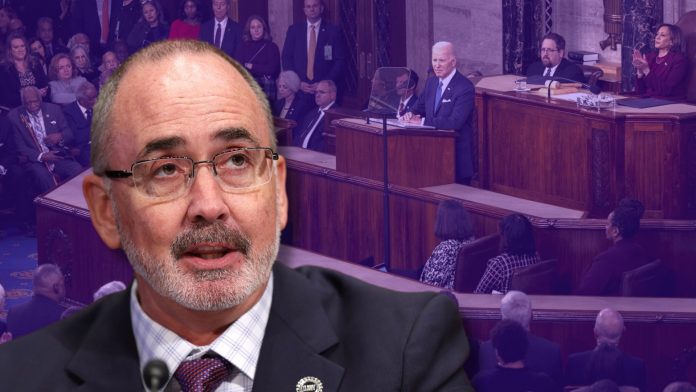During his final State of the Union address before the 2024 White House election, President Joe Biden highlighted his administration’s alliance with the United Auto Workers (UAW) union but refrained from discussing electric vehicle policies that have created tensions with multiple sectors in the automotive industry.
UAW chief Shawn Fain was a special guest at the address, joining First Lady Jill Biden in the House gallery viewing box to watch the President’s speech. Last year, Biden made history as the first sitting President to attend a front-line picket rally during the six-week auto workers strike against the Detroit-Three that lasted through October.
During that period, his administration expressed support for the union, even as labor leaders criticized the White House for its lack of support over the years. Fain initially refused to endorse the President, despite the UAW’s long tradition of supporting democratic candidates, although he made it clear he would not be throwing the organization’s support behind Republican front-runner Donald Trump either.
In his address, Biden recalled the fight for Stellantis’ Belvidere, Illinois plant, which the automaker said it would shut down at the start of last year. The closure was a key issue for UAW officials during their negotiations with Detroit-Three automakers due to the number of union members at risk of losing work.
In what he called a “comeback moment,” Stellantis caved to pressure from labor leaders, agreeing to keep the factory open and retooling it for new projects. Biden tied this success to a broader narrative concerning the revitalization of the American economy following the COVID-19 pandemic.
Earlier this year, Fain and the UAW officially endorsed the President after a notable delay, which he attributed to the organization having other priorities, such as the launch of a campaign to unionize more U.S. automakers.
While Biden and Fain appeared to have reached an understanding, one elephant in the room was left unaddressed: the electric vehicle sector. The White House has made EVs a critical component of its strategy to combat climate change, much to the chagrin of both foreign and domestic manufacturers, lawmakers, auto workers, and dealers.
A notable area of contention is the Biden Administration’s aggressive emissions policies, which would push automakers to quickly transition away from gas-fueled vehicles and pursue electrification in the span of a decade. That timeline, according to both the UAW and the general industry, is too aggressive due to obstacles, including inadequate charging infrastructure and consumer range anxiety, and would negatively impact the car sector and force layoffs among manufacturing employees.
Where Biden and Fain stand on EVs is presently unclear, as the two have not discussed the issue publicly since the endorsement. But earlier this year, the Environmental Protection Agency, the authority responsible for proposing the emissions rules, signaled it may loosen restrictions to give automakers more time to achieve their carbon reduction goals.



